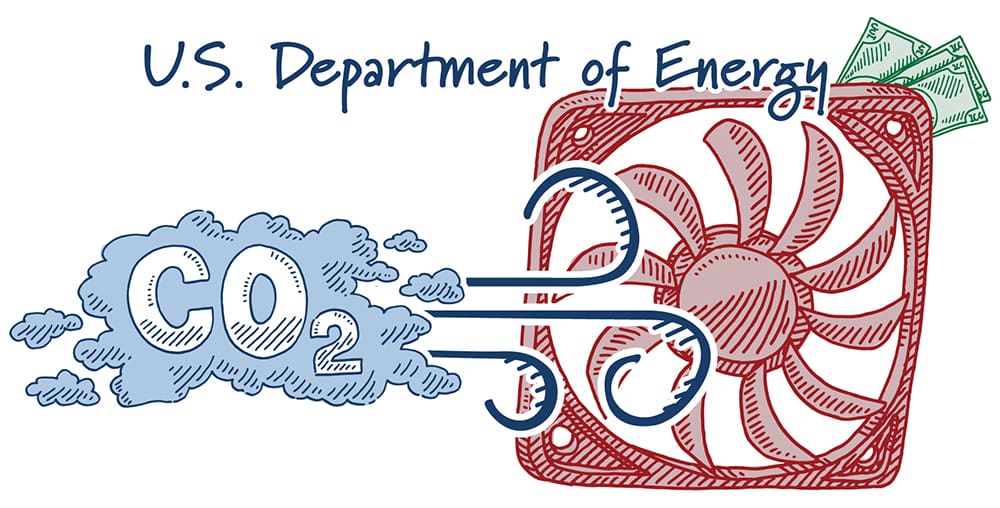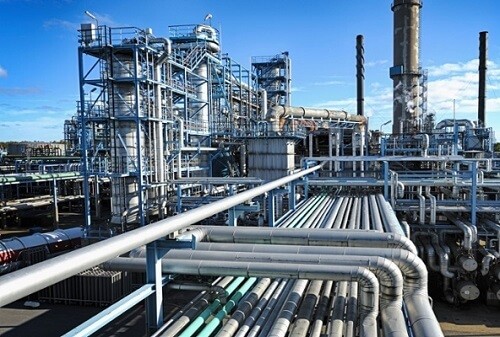
DOE Announces Plans to Invest in Carbon Dioxide Transport FEED Studies
Published by Todd Bush on October 21, 2024
The U.S. Department of Energy (DOE), through its Office of Fossil Energy and Carbon Management (FECM), recently revealed plans to continue investing in front-end engineering and design (FEED) studies for carbon dioxide (CO2) transport.
This announcement follows the success of projects solicited under DE-FOA-0002730, and the new initiative will receive funding from the Bipartisan Infrastructure Law.
The goal is to further develop infrastructure for transporting CO2 from emission sources to conversion or secure geologic storage sites, accelerating efforts toward reducing carbon emissions.
>> RELATED: DOE Unveils Carbon Management Strategy to Drive a Net-Zero Future

Addressing the CO2 Transport Challenge
One of the critical challenges in carbon management is the location of CO2 emitters, such as fossil energy power plants, ethanol facilities, and other industrial operations.
Many of these sites are far from suitable geologic storage areas, making transportation a key factor.
A robust CO2 transport network is essential to connect these sources to locations where CO2 can either be stored or used as a feedstock to manufacture chemicals and other products.
The importance of such a network cannot be overstated. "A CO2 transport system is vital for achieving our net-zero carbon emissions goals," said one representative from the DOE.
These projects, aimed at building large-scale infrastructure, will play a major role in reaching the Administration’s targets of net-zero carbon emissions in the power sector by 2035 and the broader economy by 2050.
Types of Carbon Capture and Transport Modes
The DOE anticipates that the projects funded will explore various carbon capture methods, including both direct air capture and biomass carbon removal and storage (BiCRS).
These technologies aim to capture CO2 from different point sources, such as industrial plants and power generation facilities.
For transporting captured CO2, all modes are on the table: pipelines, trucks, rail, barges, and ships.
The flexibility in transport methods ensures that projects can adapt to the geographic and logistical challenges of connecting CO2 emitters with storage or conversion sites.

>> In Other News: SunHydrogen on Track for 1m² Pilot Demonstration of its Green Hydrogen Panels
NETL's Role in Managing Projects
The National Energy Technology Laboratory (NETL) will be responsible for managing any selected projects under this new initiative. NETL has a proven track record of driving innovation and delivering solutions aimed at creating an environmentally sustainable and economically prosperous energy future.
By leveraging their world-class talent and research facilities, NETL ensures that energy resources are used efficiently while reducing the environmental impact of carbon emissions.
"NETL continues to ensure the development of technologies to manage carbon across its full life cycle," a NETL spokesperson stated, highlighting the lab’s commitment to sustainable energy solutions.
Their expertise will be crucial in ensuring that the FEED studies funded through this initiative align with broader national goals for energy security and environmental sustainability.
Expected Timeline and Application Process
While the DOE has not yet issued a formal solicitation, it is expected that any new applications will be similar to those submitted under DE-FOA-0002730.
Interested parties are encouraged to monitor the NETL solicitations web page for updates, as the solicitation may be issued in either the first or second quarter of FY25.
If a solicitation is released, it will include specific instructions and application requirements.
This continued funding opportunity is expected to attract a wide array of applicants, especially those involved in industries that emit large amounts of CO2 but are not close to suitable geologic storage sites.
The projects funded through these solicitations will be critical in accelerating the development of a large-scale carbon storage industry, which is needed to meet long-term emission reduction goals.
A Future of Net-Zero Emissions
The DOE’s investment in CO2 transport infrastructure is part of a broader push to create a carbon storage industry capable of meeting the nation’s long-term environmental goals.
By developing technologies for capturing and storing CO2, the U.S. aims to significantly reduce its carbon footprint, particularly in sectors like power generation and heavy industry.
The ongoing development of CO2 transport networks will allow for greater flexibility in carbon management strategies.
Whether used for storage in subsurface geologic formations or for conversion into valuable products, the captured CO2 will no longer pose a threat to the environment.
The success of these projects could have far-reaching impacts, not only by helping the U.S. meet its emission reduction targets but also by serving as a model for other countries looking to implement similar strategies.
The DOE’s continued focus on innovation and sustainable energy solutions will be key to achieving these goals.
"We are committed to developing the infrastructure needed to achieve a net-zero carbon future," another DOE official emphasized, highlighting the importance of ongoing investment in CO2 transport and storage technologies.
As the world moves towards a more sustainable future, investments like these will ensure that industries can continue to operate efficiently while minimizing their environmental impact.
The DOE's initiative marks a significant step forward in the fight against climate change, laying the foundation for a cleaner, more sustainable energy landscape.
Subscribe to the newsletter
Daily decarbonization data and news delivered to your inbox
Follow the money flow of climate, technology, and energy investments to uncover new opportunities and jobs.
Latest issues
-
The Three-Continent Move That Redefines SAF
Wishing everyone a restful holiday season.🎄🎅🎁 Inside this Issue ✈️ Cathay Goes Global With SAF in Three-Continent Fuel Deal 🧪 Proton Ventures Partners With Barents Blue For Realization Of The Bar...
-
Can One Truck Fix Hydrogen’s Biggest Problem?
Inside This Issue 🚛 Alberta's Shared Truck Model Could Crack Hydrogen Adoption ✈️ ZeroAvia Completes Financing Round 🌾 Frontier And NULIFE Scale New Biowaste Carbon Removal Approach 🔥 WAGABOX® Of ...
-
North America’s Carbon Removal Year in Review: Winners, Losers, Surprises
Inside This Issue 🌎 North America's Carbon Removal Year in Review: The Deals, Policies, and Milestones That Shaped 2025 🚢 Hapag-Lloyd And North Sea Container Line Win ZEMBA Second E-Fuel Tender 🪨 ...
Company Announcements
-
ClimeFi Announces New 85,000 Tonne Procurement Round
In its latest procurement round, ClimeFi has enabled more than US$18m in durable carbon removal purchases across eight removal pathways: Biochar, Bioenergy with Carbon Capture and Storage (BECCS), ...
-
Vallourec, a world leader in premium seamless tubular solutions, and Geostock, a global specialist in underground storage of energy, have signed a Memorandum of Understanding (MoU) to strengthen th...
-
CMA CGM, DHL Step Up Ocean Freight Decarbonization with Biofuel Deal
DHL Global Forwarding and shipping group CMA CGM have agreed to jointly use 8,990 metric tons of second-generation biofuel to reduce emissions from ocean freight. The initiative is expected to cut...
-
Next-Generation Gas Turbine Control System For Thermal Power Plants Completes Functional Testing
Integration of Mitsubishi Power's control technology with Mitsubishi Electric's high-speed data processing technology Supports rapid load adjustments and diverse fuels including hydrogen Tokyo, ...